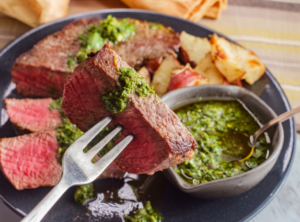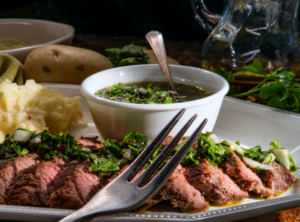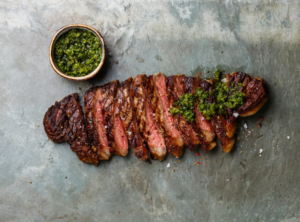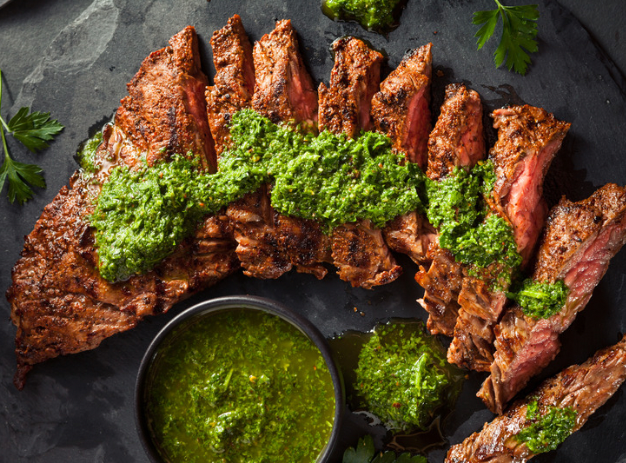Discovering Chimichurri: A Lebanese Chef’s Perspective
As a chef, there are moments that open your eyes to new possibilities—flavors or techniques that change how you think about food. One such moment for me was the first time I encountered chimichurri. I was at an Argentine grill, and when the sauce was brought to the table, my first thought was, “Is this a version of tabbouleh?” The bright green color, the finely chopped herbs—it looked so familiar, yet it was something entirely different.

Once I tasted it, I knew I had stumbled upon something special. The freshness of the parsley, the sharpness of garlic, the tang of vinegar—it was a combination of flavors that was both bold and balanced. And then there was the olive oil, that smooth, rich backdrop that tied everything together.
I was immediately reminded of something my first chef in New York City used to say. Chef Dominique was an old-school French chef, tough and demanding. He had a way of putting things bluntly, especially when it came to food. He used to say, “In Lebanese food, the olive oil is the star, and everything else is just a condiment.” At the time, I didn’t fully grasp the weight of his words, but as I tasted that chimichurri, they came rushing back to me.

Growing up in Lebanon, extra virgin olive oil has always been a cornerstone of our cuisine. It’s more than just a cooking ingredient—it’s a part of our heritage. The Lebanese olive oil I know is robust, slightly peppery, and full of character. It’s the kind of olive oil that makes everything it touches better.
When I tasted chimichurri for the first time, I couldn’t help but wonder how it would taste with the olive oil I grew up with. Could this sauce, so rooted in its Argentine origins, find a new dimension with the flavors of Lebanon? The more I thought about it, the more excited I became. Not because I wanted to claim the sauce as my own, but because I realized that great food, no matter where it comes from, can find new expressions when paired with the best ingredients.
I began making chimichurri with Lebanese extra virgin olive oil, and the result was extraordinary. The oil added a depth and richness that complemented the vibrant flavors of the herbs and garlic, elevating the sauce to new heights. It wasn’t about changing the essence of chimichurri; it was about discovering how the flavors I grew up with could enhance something that felt both familiar and new at the same time.
Now, I offer this chimichurri, as a celebration of discovery. It’s a reminder that the world of food is vast, and that sometimes, the most unexpected combinations can lead to the most delicious outcomes. Whether you’re grilling meats or dressing a salad, this chimichurri made with Lebanese olive oil brings a richness and vibrancy that’s hard to beat. And if you’re curious to try it, I’m happy to provide this sauce upon request—because some things are too good not to share.
My Chimichurri Recipe
Now that you know the story behind my interpretation of chimichurri, it’s time to bring this vibrant sauce to life in your own kitchen. This recipe is simple yet packed with flavor, making it the perfect accompaniment to grilled meats.

Ingredients:
– 1 bunch parsley
– 2 bunch basil
– 1 tablespoon capers
– 1 tablespoon Dijon mustard
– 1 tablespoon red wine vinegar
– Pinch of salt
– Pinch of black pepper
– 1 clove garlic
– Half a small onion
– Lebanese extra virgin olive oil (amount to be added gradually as you process)
Instructions:
1. Prepare the Herbs: Begin by washing the parsley and basil thoroughly. Pat them dry with a paper towel to remove any excess moisture. Remove the thick stems and roughly chop the leaves.
2. Combine the Ingredients: In a large mixing bowl, combine the chopped parsley, basil, capers, Dijon mustard, red wine vinegar, a pinch of salt, a pinch of black pepper, garlic clove, and the half onion.
3. Process the Mixture: Using a handheld blender or food processor, begin processing the mixture. Slowly drizzle in the Lebanese extra virgin olive oil while blending. The goal is to achieve a chunky texture, not a fully smooth puree. The sauce should have some texture to it, with small bits of herbs and capers adding to the visual and textural appeal.
4. Taste and Adjust: Once the chimichurri reaches the desired consistency, taste it. Adjust the seasoning if necessary, adding more salt, pepper, or vinegar to suit your palate.
5. Serve and Enjoy: Transfer the chimichurri to a serving bowl and enjoy it immediately, or refrigerate it for later use. This sauce pairs beautifully with grilled meats, adding a burst of fresh, zesty flavor that complements the richness of the dish.
This chimichurri, is sure to become a favorite in your kitchen. Its robust flavors, enhanced by the superior quality of Lebanese olive oil, make it a versatile and delicious addition to a wide great steaks. Bon Apetite!
